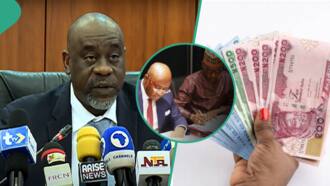CBN Forex Policy Triggers 70% Fall in Naira From N464 to N789 in 2 Months
- The CBN's currency float saw the naira dip by 70% between May and July
- Foreign currency deposits increased by N7.71 trillion as a result of recent changes to the forex market
- The increase in quasi-money caused the broad money supply, M2, to increase by 17%
PAY ATTENTION: Сheck out news that is picked exactly for YOU ➡️ click on “Recommended for you” and enjoy!
Analysis has shown that the Central Bank of Nigeria's (CBN) most recent forex market policies exacerbated the rise of money supply.
The naira depreciated by 70% to N789.08 per dollar in July from N464.67 at the end of May.
The development has been attributed to policies of the CBN such as the abolition of multiple exchange rates and the implementation of the willing seller-willing buyer model in the Investors and Exporters, I&E, currency market.

Source: UGC
Legit.ng earlier reported that CBN abolished the country's multiple exchange rate system and floated the naira currency as President Bola Tinubu moves to revamp the country's monetary policies.
PAY ATTENTION: Follow us on Instagram - get the most important news directly in your favourite app!
Meanwhile, the CBN on Thursday, August 10, 2023, blamed the continued crash of the naira against the dollar on unofficial diaspora remittances.
Financial experts told Financial Vanguard that the sudden increase in the money supply may have also been caused by other reasons, including consumer behaviour, interest rates, investments, and broader economic conditions.
Foreign currency increases
The value of foreign currency deposits increased by N7.71 trillion as a result of recent changes to the forex market, which generated a substantial increase in Nigeria's money supply of 17% in the two months leading up to July.

Read also
Naira value falls again against US dollar as NNPC’s $3bn loan deal delay leaves CBN helpless
This new development, according to economists, will have serious effects on the economy, including an increase in inflationary pressure, a further increase in the MPR, and higher manufacturing costs.
The economy has been struggling with an increase in the inflation rate, which reached 24.8% in July and reflects a steady rise in the cost of goods and services brought on by a number of causes like as insecurity, the Russia-Ukraine war, the depreciation of the naira, and an expansion of the money supply.
Quasi money improved significantly
Quasi Money, a significant part of the money supply that includes bank clients' foreign currency deposits, savings, and fixed deposits, saw a significant increase over the course of these two months, rising substantially by N7.71 trillion or 23 percent to N40.77 trillion in July from N33.06 trillion in May.
As a result, growth was up an average of 11.45% throughout the course of the two months.
This is in contrast to the 0.64 percent average growth seen in the five months prior, from January to May, and suggests that the rapid growth seen in June and July.
Quasi money triggers broad money supply to increase
Additional information revealed that the N7.71 trillion increase in quasi money caused the broad money supply, M2, to increase by 17% over the course of two months, from N55.55 trillion in May to N64.93 trillion in July.
Prior to June, the average monthly growth rate of M2, which consists of Quasi Money, Narrow Money, and M1, was 1.23 percent, rising from N52.84 trillion in January to N55.55 trillion in May.
However, in June and July, M2's average growth rate jumped to 8.3%.
Quasi Money accounted for 82% of the growth in M2 over the course of the two months, while M1 was responsible for the remaining 18%, according to CBN data.

Read also
Naira appreciates by 4.5% against US dollar at official FX market as traders create more headache for CBN
CBN to Introduce Contactless Payment Guide That Will Turn Phones, Watches into PoS, ATMs
Earlier, Legit.ng reported that the CBN announced it would be issuing guidelines for using contactless payment systems in the country.
The guidelines are part of CBN's overall objective to promote the safe and efficient use of cashless payments.
Adeyemi Adefuye, Deputy Director of the Payment System Management Department of the CBN, made this known in Calabar, Cross River State, recently.
Source: Legit.ng


